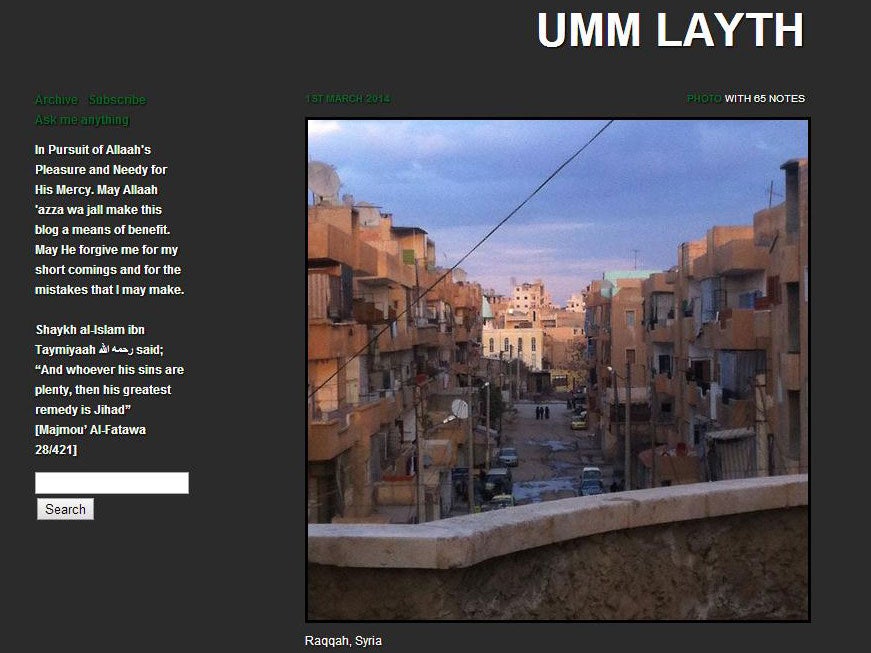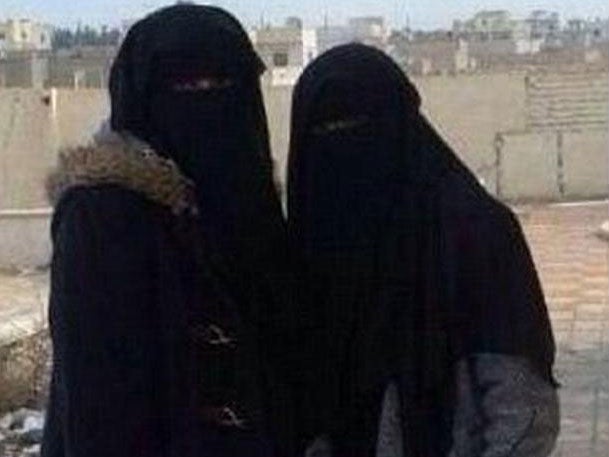How Isis attracts women and girls from Europe with false offer of 'empowerment'
New research finds notion of 'brainwashed jihadi brides' is overly-simplistic

Your support helps us to tell the story
From reproductive rights to climate change to Big Tech, The Independent is on the ground when the story is developing. Whether it's investigating the financials of Elon Musk's pro-Trump PAC or producing our latest documentary, 'The A Word', which shines a light on the American women fighting for reproductive rights, we know how important it is to parse out the facts from the messaging.
At such a critical moment in US history, we need reporters on the ground. Your donation allows us to keep sending journalists to speak to both sides of the story.
The Independent is trusted by Americans across the entire political spectrum. And unlike many other quality news outlets, we choose not to lock Americans out of our reporting and analysis with paywalls. We believe quality journalism should be available to everyone, paid for by those who can afford it.
Your support makes all the difference.Women and girls are joining Isis after being seduced by the terrorist group’s offer of a twisted version of “empowerment” for Muslims, a new report has found.
The research, by the Royal United Services Institute for Defence and Security Studies (RUSI), said the reasons that drove hundreds of women to journey from Europe to Isis territories were “complex”.
Emily Winterbotham, the report’s co-author, said the use of the term “jihadi bride” to describe all female Isis members was reductive.
“Our research shows that narrative has influenced people’s perceptions of female radicalisation,” she told The Independent.
“Most people we interviewed believed women had been lured over to Isis by men, social media and marriage, with the men being the bad ones.
“There’s an implied rationality around male radicalisation and passivity around women … but the decision-making process of these individuals isn’t only about being manipulated and brainwashed – there’s a clear rationale.”
Possible draws were found to include “a rejection of Western feminism, online contact with recruiters who offer marriage and adventure, peer or family influence, adherence to Isis ideology, naivety and romantic optimism, and the chance to be part of something new, exciting and illicit”.
Ms Winterbotham, a senior research fellow at RUSI, and co-author Elizabeth Pearson, a RUSI associate fellow and a PhD candidate in war studies at King’s College London, conducted their research in the UK, Canada, France, Germany and the Netherlands.
After speaking to men and women who knew female Isis supporters or worked in de-radicalisation programmes, they found that some women saw the so-called Islamic State as a source of “empowerment” despite its subjugation of women, violent enforcement of its interpretation of Sharia law and genocide against the Yazidis.
Some respondents told researchers women who joined Isis were “deliberately seeking to challenge both traditional and Western-imposed gender norms, by seeking a new identity for themselves”.
Communities said the urge was partly being driven by “exclusion from wider society”, particularly in countries with burqa bans, such as the Netherlands and France, where they felt they could not express their religion how they wished.
Like recent research focused on returned male foreign fighters, the report found that radicalisation was also driven by grievances including Islamophobic attacks, economic disadvantage, a perceived lack of belonging and failed integration.
A lack of acceptance from within Muslim communities, particularly divides with family members not thought to be pious enough, was also believed to “enable women to find a sense of belonging and empowerment with Daesh [Isis].
Ms Winterbotham said that those living in highly conservative religious families could also be made vulnerable to Isis propaganda by having less freedom to travel outside and spending more time with radical influences online.
“We talked to women who hadn’t been radicalised but could understand why some of these girls might have gone to Syria and Iraq so they could live as ‘good Muslims’,” she said.
“Isis has been successful at selling that image to women. It’s not just about the naïve vulnerable jihadi bride, it’s women saying: ‘This is in line with my religion, my political beliefs, the fact I want to live how I want’.”
The author said the concept of “empowerment” differed from what would be shared by most non-Muslim Western women, being seen through a dominantly religious lens.
“Women are saying ‘this is empowering for me’ but the irony is that’s not going to happen once they get there,” she added.
Isis has directly targeted female recruits to migrate to its territories as part of its aspiration to build a functioning “caliphate” needing wives and mothers to bear children trained to become the “next generation” of terrorists.
Women have been stoned, whipped and murdered for offences under Sharia law, while at least one jihadi bride – Austrian teenager Samra Kesinovic – is known to have been beaten to death while trying to escape.
While the role of women is strictly restricted in Isis territories, with dress, movement and marriage all strictly controlled, fanaticism is rewarded with limited freedoms such as being allowed into female-only Sharia police forces or permitted to go online to bring “sisters” back home into the fold.

British women are among some of the most prominent online radicalisers and propagandists, including the “White Widow” Sally Jones, who is reportedly attempting to flee Raqqa, Khadijah Dare Aqsa Mahmood, a former Scottish university student, who has been put under international sanctions for her role as an online recruiter.
Under the online pseudonym Umm Layth, she operated now-deleted social media accounts and blogs calling for terror attacks, romanticising life under Isis and issuing detailed instructions for women wishing to travel to its territories.
“We are created to be mothers and wives - as much as the western society has warped your views on this with a hidden feminist mentality,” she wrote.
The narrative is typical of Isis’ own propaganda, which portrays women as valued supporters with agency within their families, who gain status from their husbands’ perceived glory.
A recent article instructing women to “Be a Supporter, Not a Demoraliser” as the group’s territory wanes, concluded: “Such is the condition of the believing wife with her husband, and such is the condition of the believing mother with her son, letting him go forth on his way to wage jihad against the enemies of Allah, doing what Allah commanded him to do, and by Allah’s permission, she will receive a portion of his deed.”
The number of foreign women living in the so-called Islamic State is uncertain. A 2014 report estimated that 18 per cent all European Isis members were female and the total number is now believed to be more than 550.

The Metropolitan Police suggested that more than 56 women and girls had travelled to Iraq and Syria from the UK by early 2015 and the number is believed to have risen considerably since.
A global crackdown on travel to Isis territory and increasing preventative arrests have brought the exodus to a halt but a growing number of women are becoming involved in terror plots on home soil.
A 17-year-old girl from London who attempted to travel to Syria has been charged with colluding with Isis to plan an atrocity in the UK.
After she was prevented from reaching Syria in August last year, she allegedly “married” an Isis fighter in the country over the online messaging service Skype and arranged to receive weapons training, hand grenades and a gun for the attack.
RUSI’s report noted that women were involved in Isis’ Paris attacks in 2016 and a number of recently disrupted plots, warning that assumptions about women’s “passivity in radicalisation” could be making the process more difficult to spot.
Among the signs seen in the report were changes to clothing and appearance, relationships, hobbies, a fresh interest in politics and foreign affairs, justifying Isis and attempts to “convert” relatives or censor them for “un-Islamic behaviour”.
“Isis has Muslim heritage communities in its sights,” the report warned. “The findings from the research clearly show the significance of gender in radicalisation, and the dangers in arguing that everything is equal between men and women.”
Join our commenting forum
Join thought-provoking conversations, follow other Independent readers and see their replies
Comments